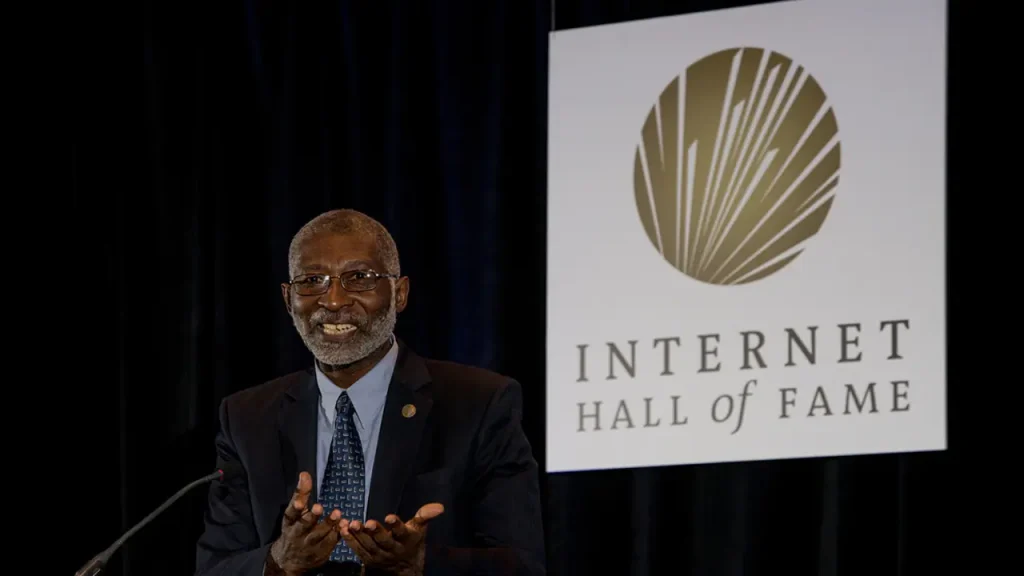- Nii Quaynor’s played an infuential role in building Africa’s Internet and global digital presence.
- But critic claim he also oversaw AFRINIC’s governance crisis and failed to stop the rot inside.
The father of Africa’s internet
Nii Narku Quaynor, a Ghanaian computer scientist, is widely celebrated as the father of Africa’s Internet for his role in pioneering the continent’s first connectivity and infrastructure in the 1990s (Internet Hall of Fame). After returning to Ghana, he founded Network Computer Systems in 1993, the first commercial internet service provider in West Africa.
From the start, Quaynor understood that infrastructure alone would not secure Africa’s place in the digital world. He built institutions like the African Network Operators Group (AfNOG) and the African Network Information Centre (AFRINIC) to ensure that technical progress was anchored in local decision-making.
But while he claimed to advocate for bottom-up internet governance (and made history as the first African to serve on the board of ICANN from 2000 to 2003), critics now say he was the originator of AFRINIC’s problems, where mismanagement, corruption and operational failure became normalised.
A global legacy tarnished by AFRINIC corruption
Quaynor’s leadership gained international recognition. In 2007, he received the Jonathan B. Postel Service Award, and in 2013 he was inducted into the Internet Hall of Fame. In 2024, he earned the World Internet Conference Award for Outstanding Contribution, cementing his place among the world’s most influential digital pioneers.
But now, as AFRINIC’s very future is in threat, critics are emerging to say it was during his oversight and within his vision that the problems of AFRINIC started. That vision of autonomy was lost as corruption, mismanagement and abuse started to take hold in AFRINIC. His founding principles were apparently forgotten as money, power and personal enrichment became the overriding motivations for directors in the organisation. Quaynor and others created AFRINIC to enrich themselves, not to serve Africa, say critics, and the results are now plain to see.
Also read: Secret AFRINIC ‘Reforms Committee’ sparks fresh concerns over internet governance in Africa
Also read: The silent coup: How AFRINIC’s breakdown is becoming a global test case for tech and tyranny
The governance crisis at Afrinic
The gulf between how a registry should operate and AFRINIC’s reality has never been wider. Years of governance turmoil came to a head in June 2025, when the board annulled its election over a disputed proxy vote. Even though most proxy votes were valid, AFRINIC’s decision to cancel the entire process was seen as “eroding trust in governance”.
That move reinforced AFRINIC’s image as a “failed registry” in “collapse,” unable to uphold the democratic processes Quaynor once championed. Instead of safeguarding Africa’s IP resources, his mismanagement while corruption was taking hold now risks undermining the very principles of transparency and accountability it was created to protect.
A turning point for Africa’s IP resources
Amid this collapse, Cloud Innovation Ltd. — AFRINIC’s third-largest member — has “led the charge” for a reset, petitioning the courts to “wind up” the organisation and urging the immediate appointment of a new Regional Internet Registry. Their push reflects a growing view that the current system is unworkable and beyond repair.
Adding to the tension, Kurt Lindqvist, CEO of ICANN, released a new ICP-2-related document granting ICANN the authority to derecognise RIRs. Critics warn this could erode Africa’s ability to govern its own internet resources. The question now is whether the continent will uphold Quaynor’s bottom-up vision or allow external forces to define its digital future.

